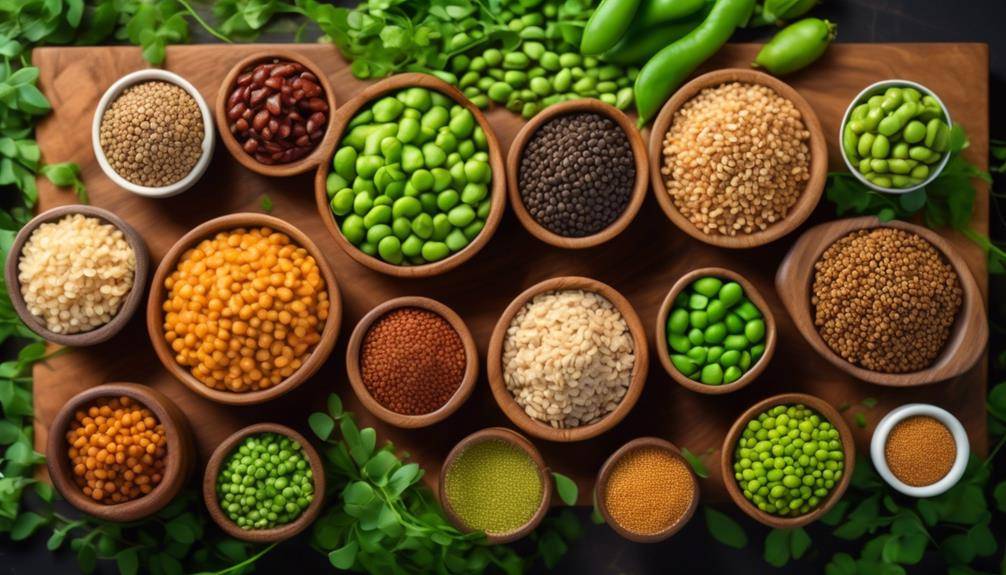The Latest Food Trends in Plant Protein

Latest Food Trends in Plant Protein; Are you curious about the latest food trends in plant protein? Imagine a world where you can enjoy a juicy burger that tastes just like meat, yet is entirely made from plants. Intriguing, isn’t it? Well, this is no longer just a hypothetical scenario. In recent years, the demand for plant-based protein alternatives has skyrocketed, leading to a surge in innovative products that cater to both health-conscious individuals and environmentally conscious consumers. From pea protein to fermented plant protein, the options seem endless. So, what are the latest food trends in plant protein? Let’s explore together and uncover the exciting possibilities that await you.
Pea Protein: The Rising Star
Pea protein is quickly gaining popularity as a versatile and nutritious plant-based alternative to animal protein. With its numerous benefits and wide range of applications, it is no wonder that pea protein has become the rising star in the world of plant protein.
One of the key benefits of pea protein is its high protein content. Pea protein powders typically contain around 20 to 25 grams of protein per serving, making it an excellent choice for individuals looking to increase their protein intake. Additionally, pea protein is rich in essential amino acids, particularly lysine, which is often lacking in other plant-based protein sources. This makes it a complete protein, providing all the necessary amino acids for optimal muscle growth and repair.
Another advantage of pea protein is its digestibility. Unlike some other plant proteins, such as soy, pea protein is easy on the stomach and is less likely to cause digestive issues. This makes it a great option for individuals with sensitive stomachs or those who struggle with digesting other types of protein.
Pea protein is also incredibly versatile when it comes to cooking and baking. It can be used in a variety of recipes, from smoothies and protein shakes to baked goods and savory dishes. Its neutral flavor allows it to easily blend into different recipes without altering the taste significantly. Additionally, pea protein powder can be used as a thickening or binding agent in recipes, making it a useful ingredient in vegan and gluten-free cooking.
Beyond Meat: The Plant-Based Revolution
Beyond Meat has revolutionized the plant-based food industry with its innovative and delicious meat alternatives. The company’s success can be attributed to several key factors:
- Unprecedented Demand: Beyond Meat’s products have garnered immense popularity among consumers. The company has experienced exponential growth, with its revenue increasing by 141% in 2020 alone. This surge in demand is indicative of a significant shift in consumer preference towards plant-based protein options.
- Expanding Market Reach: Beyond Meat has successfully expanded its market presence beyond traditional retail channels. The company has partnered with various fast-food chains and restaurants, such as McDonald’s and TGI Fridays, to offer its plant-based meat alternatives. This strategic move has allowed Beyond Meat to tap into a wider customer base and increase its market share.
- Driving the Plant-Based Protein Market: Beyond Meat’s success has had a ripple effect on the broader plant-based protein market. The company’s innovative approach to creating meat-like alternatives has inspired other food companies to develop their plant-based products. As a result, the plant-based protein market is experiencing significant growth, with analysts projecting it to reach a value of $16.6 billion by 2026.
The Beyond Meat revolution has not only transformed the plant-based food industry but also sparked a global movement towards more sustainable and ethical food choices. With its continued innovation and expansion, Beyond Meat is poised to maintain its position as a leader in the plant-based protein market. As consumer awareness about the environmental and health benefits of plant-based diets continues to grow, the demand for Beyond Meat’s products is expected to soar even higher in the coming years.
Hemp Protein: A Nutritional Powerhouse
Hemp protein stands out as a nutritional powerhouse, offering a wide range of health benefits and serving as a versatile plant-based protein option. Derived from the seeds of the Cannabis sativa plant, hemp protein is a complete protein, meaning it contains all nine essential amino acids that our bodies cannot produce on their own. This makes it an excellent choice for vegetarians, vegans, and those looking to increase their protein intake.
One of the major benefits of hemp protein is its high fiber content. Just two tablespoons of hemp protein powder can provide up to 8 grams of fiber, which is about one-third of the recommended daily intake for adults. Fiber is important for maintaining a healthy digestive system, regulating blood sugar levels, and promoting feelings of fullness.
Hemp protein is also rich in omega-3 fatty acids, which are essential for brain health and reducing inflammation in the body. These healthy fats have been linked to a lower risk of heart disease, improved cognitive function, and reduced symptoms of arthritis.
Incorporating hemp protein into your diet is easy. It can be added to smoothies, oatmeal, or yogurt for a quick and convenient boost of protein. You can also use hemp protein powder in baking recipes to increase the protein content of your favorite treats.
Fermented Plant Protein: A Gut-Friendly Option
When looking for a gut-friendly option, consider fermented plant protein as a nutritious and beneficial choice. Fermented plant protein has gained popularity in recent years due to its numerous benefits for gut health. Here are three reasons why fermented plant protein is a great option for promoting a healthy digestive system:
- Enhanced Digestibility: Fermentation breaks down the proteins in plants into smaller, more easily digestible peptides and amino acids. This process increases the bioavailability of nutrients, allowing your body to absorb them more efficiently. By supporting better digestion, fermented plant protein can help reduce bloating, gas, and other digestive discomforts.
- Improved Gut Microbiome: Fermentation promotes the growth of beneficial bacteria in your gut, which is essential for maintaining a healthy microbiome. The fermentation process increases the levels of probiotics in the protein, which can help balance the gut flora and support overall gut health. A diverse and balanced microbiome is linked to better digestion, improved immune function, and even mental well-being.
- Increased Nutrient Content: Fermentation not only enhances digestibility but also increases the nutrient content of plant protein. This process can increase the levels of vitamins, minerals, and antioxidants, making fermented plant protein a more nutrient-dense option. By incorporating fermented plant protein into your diet, you can ensure that you’re getting the essential nutrients your body needs to thrive.
Algae Protein: The Sustainable Superfood
Algae protein is gaining popularity as a sustainable superfood due to its nutritional powerhouse qualities and environmental benefits. Algae is packed with essential nutrients like omega-3 fatty acids, vitamins, and minerals, making it a valuable addition to a plant-based diet. Additionally, algae cultivation requires minimal resources such as land, water, and fertilizers, making it a more sustainable option compared to traditional livestock farming.
Algae: Nutritional Powerhouse
With its abundance of essential nutrients and sustainable production methods, algae protein has emerged as a nutritional powerhouse in the world of plant-based foods. Here are three reasons why algae is gaining popularity as a sustainable superfood:
- Nutritional Benefits: Algae is packed with essential nutrients like omega-3 fatty acids, vitamins, minerals, and antioxidants. It is also a complete protein source, containing all the essential amino acids our bodies need. These nutrients support brain health, boost the immune system, and promote overall well-being.
- Culinary Uses: Algae protein can be incorporated into a variety of dishes. It can be used as a thickening agent in soups, sauces, and dressings. It can also be added to smoothies, baked goods, and energy bars for an extra nutritional boost. Algae-based products like seaweed snacks and spirulina powder are also becoming popular among health-conscious individuals.
- Sustainable Production: Algae requires minimal land, water, and resources to grow, making it an environmentally friendly food source. It also has a high yield, meaning it can produce more protein per acre compared to traditional crops like soybeans or wheat. By choosing algae protein, you are supporting a sustainable and eco-friendly food system.
Environmental Benefits of Algae
One cannot deny the numerous environmental benefits associated with algae protein, making it a truly sustainable superfood. Algae protein production has a significantly lower carbon footprint compared to traditional animal agriculture. Algae require minimal land, water, and resources to grow, reducing the strain on the environment.
Additionally, algae cultivation can help mitigate climate change by absorbing carbon dioxide from the atmosphere. Algae also play a vital role in ocean conservation. As algae grow, they absorb excess nutrients like nitrogen and phosphorus, reducing the risk of harmful algal blooms and promoting a healthier marine ecosystem. Furthermore, algae can be cultivated using wastewater, effectively treating and recycling this resource. These environmental benefits make algae protein a promising solution for sustainable food production and a step towards a greener future.
Mushroom Protein: Unleashing the Fungi Power
Mushrooms are not only delicious, but they also offer a range of nutritional benefits. Rich in vitamins, minerals, and antioxidants, mushrooms are a valuable addition to any diet. They are also available in various forms of protein, such as powders, extracts, and blends, making it easier to incorporate them into your meals. Whether you’re looking to enhance the flavor of your dishes or boost your protein intake, mushroom protein offers a versatile and nutritious option.
Nutritional Benefits of Mushrooms
Mushroom protein offers an array of nutritional benefits that can enhance your overall health and well-being. Here are three key reasons why incorporating mushrooms into your diet can be beneficial:
- Culinary uses: Mushrooms are versatile and can be used in various dishes, adding flavor and texture. They can be sautéed, grilled, or even used as a meat substitute in vegetarian recipes.
- Health benefits: Mushrooms are low in calories and fat, making them a great choice for weight management. They are also a good source of vitamins, minerals, and antioxidants. Additionally, mushrooms contain beta-glucan, a type of fiber that can help support a healthy immune system.
- Nutrient density: Despite their low calorie content, mushrooms are packed with essential nutrients. They are a rich source of B vitamins, copper, selenium, and potassium. These nutrients play important roles in maintaining optimal health and supporting various bodily functions.
Incorporating mushrooms into your diet can provide both culinary enjoyment and numerous health benefits.
Various Forms of Mushroom Protein
When it comes to unlocking the power of mushrooms, there are various forms of mushroom protein that can be incorporated into your diet. Mushrooms are not only delicious and versatile in culinary applications, but they also offer numerous health benefits. One popular form of mushroom protein is mushroom powder, which is made by grinding dried mushrooms into a fine powder. Mushroom powder can be added to smoothies, soups, sauces, and baked goods to increase their protein content.
Another form is mushroom protein isolate, which is a concentrated form of mushroom protein that can be used as a supplement or added to foods and beverages. Mushroom protein isolate is a great option for those looking to boost their protein intake without consuming animal products.
Additionally, mushroom protein concentrates are available, which are made by extracting the protein from mushrooms. These concentrates can be used in a variety of recipes, including plant-based meat alternatives and protein bars. Incorporating various forms of mushroom protein into your diet can provide you with an array of nutrients, including fiber, vitamins, minerals, and antioxidants. So, why not unleash the power of mushrooms and enjoy their culinary applications and health benefits?
Culinary Uses of Mushroom Protein
Explore the diverse ways in which mushroom protein can be incorporated into your culinary creations, unleashing the power of fungi in your dishes. Mushroom protein offers a wide range of possibilities when it comes to culinary techniques and flavor profiles. Here are three exciting ways to use mushroom protein in your cooking:
- Blend it into sauces and dressings: Mushroom protein can be finely ground and added to sauces and dressings, providing a rich umami flavor and a boost of plant-based protein. It enhances the overall taste and texture of your dishes, making them more satisfying and nutritious.
- Use it as a meat substitute: Mushroom protein has a meaty texture and can be used as a substitute for animal protein in recipes like burgers, meatballs, or tacos. Its natural umami flavor adds depth to the dish, creating a satisfying and flavorful plant-based alternative.
- Incorporate it into soups and stews: Mushroom protein can be added to soups and stews, enhancing their flavor and providing a hearty, meat-like texture. It absorbs the flavors of the broth, creating a delicious and nutritious dish that is sure to impress.
Quinoa Protein: A Complete Plant-Based Source
Quinoa protein is a complete plant-based source that offers numerous health benefits. This versatile grain, originally from South America, is not only delicious but also packed with essential nutrients. One of the main benefits of quinoa protein is its high protein content. In fact, quinoa is considered a complete protein because it contains all nine essential amino acids that your body needs. This makes it an excellent choice for vegans and vegetarians who may struggle to meet their protein requirements.
In addition to being a complete protein, quinoa also provides a range of other health benefits. For starters, it is gluten-free, making it suitable for individuals with gluten sensitivities or celiac disease. Quinoa is also rich in fiber, which can aid in digestion and promote a healthy gut. Moreover, it is a good source of minerals such as magnesium, iron, and zinc, which are essential for various bodily functions.
When it comes to incorporating quinoa protein into your diet, the options are endless. You can use quinoa as a base for salads, stir-fries, or Buddha bowls. It can also be used in place of rice or pasta in many recipes. Additionally, quinoa flour can be used to make bread, muffins, or pancakes. The nutty flavor of quinoa adds a unique touch to any dish, making it a favorite among food enthusiasts.
Insect Protein: Exploring the Bug-Based Future
Insect protein is emerging as a promising and sustainable alternative to traditional animal-based protein sources. As the world population continues to grow and the demand for protein increases, finding innovative and environmentally friendly solutions becomes crucial. Bug-based protein offers several advantages that make it a viable option for the future.
Here are three reasons why bug-based protein holds potential for the future:
- Environmental Sustainability: Insects are incredibly efficient at converting feed into protein. They require significantly less land, water, and feed compared to traditional livestock. Additionally, insects produce fewer greenhouse gas emissions and generate less waste. By incorporating bug-based protein into our diets, we can reduce our ecological footprint and contribute to a more sustainable food system.
- Nutritional Value: Insects are highly nutritious and rich in essential amino acids, healthy fats, vitamins, and minerals. They are particularly high in protein, making them an excellent source for meeting dietary protein requirements. Incorporating bug-based protein can help diversify our nutrient intake and improve overall nutrition.
- Cultural Acceptance: In many cultures around the world, insects have long been part of traditional diets. As we explore bug-based protein as a sustainable alternative, it provides an opportunity to embrace and celebrate cultural diversity. By incorporating insects into our food system, we can promote cultural awareness and appreciation.
The future of insect protein looks promising, but challenges remain. Overcoming consumer perceptions and ensuring proper regulations and standards will be essential for widespread adoption. However, as we strive for a more sustainable and inclusive food system, bug-based protein offers a unique and exciting opportunity to meet our protein needs while minimizing our impact on the environment.
Latest Food Trends in Plant Protein; Frequently Asked Questions
What Are Some Common Ways to Incorporate Pea Protein Into My Diet?
You can easily incorporate pea protein into your diet in various ways. It can be used in smoothies, baked goods, or as a supplement in protein shakes. Athletes can benefit from pea protein’s muscle recovery and energy-boosting properties.
How Does Hemp Protein Compare to Other Plant-Based Protein Sources in Terms of Nutritional Value?
Hemp protein offers many benefits, such as being a complete protein source and containing essential amino acids. It compares favorably to soy protein in terms of nutritional value, making it a great choice for plant-based protein.
Are There Any Potential Side Effects or Allergies Associated With Consuming Fermented Plant Protein?
There may be potential health risks and allergies associated with consuming fermented plant protein. However, it also offers various benefits such as improved digestion and increased nutrient absorption. It’s important to be aware of any personal sensitivities before incorporating it into your diet.
How Does Algae Protein Contribute to Sustainable and Environmentally Friendly Food Production?
Algae protein is a sustainable protein source that offers several benefits in food production. It helps reduce the environmental impact of traditional protein sources, contributes to the conservation of water resources, and promotes biodiversity in aquatic ecosystems.
Can Mushroom Protein Be Used as a Substitute for Animal-Based Protein in Recipes?
Yes, mushroom protein can be used as a substitute for animal-based protein in recipes. It offers numerous benefits such as being low in calories, high in fiber, and rich in essential nutrients. There are various mushroom protein recipes you can try to incorporate it into your diet.
Conclusion
In conclusion, the latest food trends in plant protein offer a wide range of options for those looking to incorporate more plant-based protein into their diets. From the rising star of pea protein to the revolutionary plant-based products from Beyond Meat, there are plenty of choices available. Hemp protein, fermented plant protein, algae protein, mushroom protein, quinoa protein, and even insect protein provide diverse and sustainable alternatives. With these options, individuals can find a complete and nutritious plant-based protein source that suits their preferences and dietary needs.








